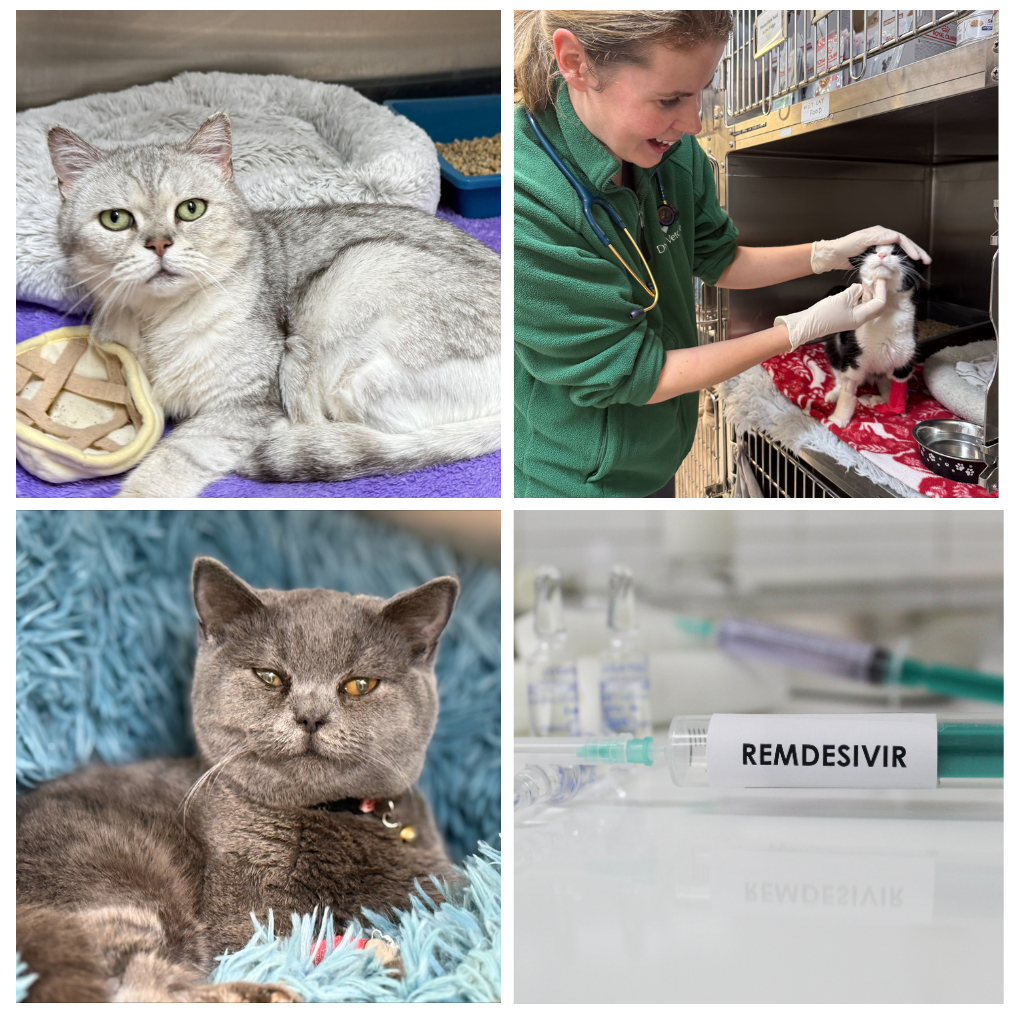FIP in Cats, From Death Sentence to Survival Story — The Remdesivir Revolution
Feline Infectious Peritonitis (FIP) used to be one of the most feared diagnoses in veterinary medicine — almost always fatal, heartbreaking, and with no licensed treatment or vaccine.
But everything has changed.
Thanks to remdesivir, a drug many will recognise from its role in COVID-19 treatment, FIP is now treatable, and survival rates are improving dramatically. In fact, with the right care, over 75% of cats with FIP are now surviving and going on to live full lives.
In just a few short years, we’ve seen a complete transformation in how we treat this once-devastating condition.
🦠 What Is FIP?
FIP is caused by a mutation of the feline coronavirus (FCoV). This virus is common, especially in multi-cat households, and usually harmless. But in rare cases, it mutates and triggers a severe immune reaction.
Two main forms:
-
Wet (effusive): fluid in chest or abdomen
-
Dry (non-effusive): inflammation in organs like brain, eyes, liver, or kidneys
Without treatment, FIP was almost always fatal — until now.
🧬 How Is It Spread?
FCoV spreads via the faecal-oral route, often through shared litter trays. Most infected cats never develop FIP, but it’s impossible to predict which might.
Prevention tips:
-
Keep litter trays clean and separate from food/water
-
Reduce overcrowding and stress
-
Maintain good hygiene and regular vet checks
🚫 No vaccine is available, so prevention focuses on reducing risk.
💊 Remdesivir: A Game-Changer in FIP Treatment
You may know remdesivir as one of the first antivirals used during the COVID-19 pandemic. But it’s now also being used to treat cats with FIP — and it’s saving lives.
Then vs Now: How Access Has Changed
| Timeframe | Access to Remdesivir for Cats |
| Pre-2021 | Not licensed for veterinary use. Owners sourced GS-441524 (a related drug) on the black market, often under names like Mutian. Treatment was risky, expensive, and unregulated. |
| 2021–2022 | COVID led to increased remdesivir production. Vets in the UK began prescribing it legally under the veterinary cascade system, where no licensed alternatives exist. |
| 2023–2025 | UK, Ireland, Australia, and EU vets now have legal, regulated access to veterinary-formulated remdesivir and GS-441524, available through licensed pharmacies. No need for grey-market sources. |
💉 Oral and Injectable Options Now Available
FIP treatment can now be started with injectable remdesivir, particularly in very sick cats, then transitioned to oral formulations as the cat improves.
When Injectable Remdesivir Is Used:
- For cats too unwell to take tablets
- For cases with neurological or gastrointestinal signs
- For emergency stabilisation over 1–3 days before moving to oral meds
Remdesivir is reported to be less painful to inject than GS-441524, though some cats still require pain relief or sedation during injections.
🤔 What’s the Difference Between Remdesivir and GS-441524?
They are closely related. In fact, remdesivir breaks down into GS-441524 inside the body.
- GS-441524 is the direct antiviral compound shown to be effective against FIP.
- Remdesivir is a prodrug — it converts to GS-441524 in the body.
Both are effective, and both are now available legally through UK veterinary channels. If GS-441524 is not available, remdesivir is the mainstay.
👩⚕️ Safer, Legal, and More Effective Than Ever
Thanks to legal veterinary access:
- Treatments are now safer, standardised, and regulated.
- Your vet can tailor the dose, monitor your cat’s progress, and manage any side effects.
- You no longer have to rely on black market sources or online forums (though groups like FIP Warriors were once a lifeline).
📈 What’s the Success Rate?
Recent data and clinical experience suggest:
- 75–85% of cats treated properly with antivirals like remdesivir or GS-441524 go into remission.
- Many cats return to normal lives post-treatment, with no long-term complications.
The key is early diagnosis and consistent veterinary care over a typical 12-week course.
At Streatham Hill Vets, we’ve already successfully treated cats with FIP using remdesivir. They are now back home, healthy, and enjoying life with their families — something that would have been unthinkable just a few years ago!

🐾 Final Thoughts
The treatment of FIP has entered a hopeful new era. Once a hopeless diagnosis, it’s now a survivable disease thanks to remdesivir and GS-441524.
If you suspect your cat may have FIP, speak to your vet as soon as possible — early intervention makes all the difference.
At Streatham Hill Vets, we’re here to support your cat from diagnosis to remission.



